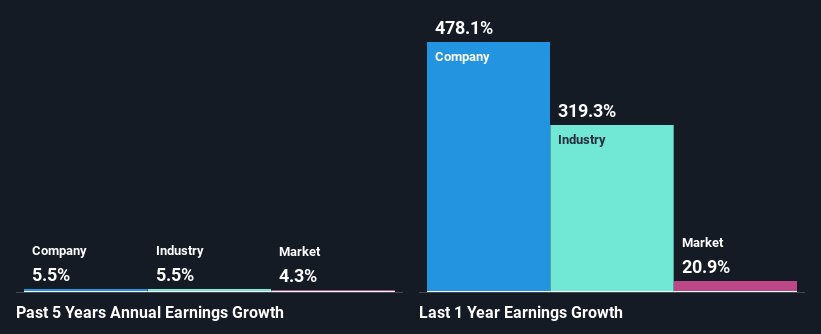Declining Stock and Decent Financials: Is The Market Wrong About Stride Property Group (NZSE:SPG)?
It is hard to get excited after looking at Stride Property Group's (NZSE:SPG) recent performance, when its stock has declined 13% over the past three months. However, stock prices are usually driven by a company’s financials over the long term, which in this case look pretty respectable. Specifically, we decided to study Stride Property Group's ROE in this article.
ROE or return on equity is a useful tool to assess how effectively a company can generate returns on the investment it received from its shareholders. In other words, it is a profitability ratio which measures the rate of return on the capital provided by the company's shareholders.
View our latest analysis for Stride Property Group
How Is ROE Calculated?
ROE can be calculated by using the formula:
Return on Equity = Net Profit (from continuing operations) ÷ Shareholders' Equity
So, based on the above formula, the ROE for Stride Property Group is:
13% = NZ$142m ÷ NZ$1.1b (Based on the trailing twelve months to September 2021).
The 'return' is the amount earned after tax over the last twelve months. One way to conceptualize this is that for each NZ$1 of shareholders' capital it has, the company made NZ$0.13 in profit.
What Has ROE Got To Do With Earnings Growth?
Thus far, we have learned that ROE measures how efficiently a company is generating its profits. We now need to evaluate how much profit the company reinvests or "retains" for future growth which then gives us an idea about the growth potential of the company. Generally speaking, other things being equal, firms with a high return on equity and profit retention, have a higher growth rate than firms that don’t share these attributes.
A Side By Side comparison of Stride Property Group's Earnings Growth And 13% ROE
At first glance, Stride Property Group seems to have a decent ROE. And on comparing with the industry, we found that the the average industry ROE is similar at 16%. This probably goes some way in explaining Stride Property Group's moderate 5.5% growth over the past five years amongst other factors.
As a next step, we compared Stride Property Group's net income growth with the industry and found that the company has a similar growth figure when compared with the industry average growth rate of 5.5% in the same period.
Earnings growth is a huge factor in stock valuation. The investor should try to establish if the expected growth or decline in earnings, whichever the case may be, is priced in. Doing so will help them establish if the stock's future looks promising or ominous. Has the market priced in the future outlook for SPG? You can find out in our latest intrinsic value infographic research report.
Is Stride Property Group Efficiently Re-investing Its Profits?
Stride Property Group's high three-year median payout ratio of 127% suggests that the company is paying out more to its shareholders than what it is making. In spite of this, the company was able to grow its earnings respectably, as we saw above. It would still be worth keeping an eye on that high payout ratio, if for some reason the company runs into problems and business deteriorates. To know the 5 risks we have identified for Stride Property Group visit our risks dashboard for free.
Moreover, Stride Property Group is determined to keep sharing its profits with shareholders which we infer from its long history of five years of paying a dividend. Our latest analyst data shows that the future payout ratio of the company is expected to drop to 89% over the next three years. Still forecasts suggest that Stride Property Group's future ROE will drop to 5.4% even though the the company's payout ratio is expected to decrease. This suggests that there could be other factors could driving the anticipated decline in the company's ROE.
Summary
In total, it does look like Stride Property Group has some positive aspects to its business. Especially the growth in earnings which was backed by an impressive ROE. Still, the high ROE could have been even more beneficial to investors had the company been reinvesting more of its profits. As highlighted earlier, the current reinvestment rate appears to be negligible. Having said that, on studying current analyst estimates, we were concerned to see that while the company has grown its earnings in the past, analysts expect its earnings to shrink in the future. To know more about the company's future earnings growth forecasts take a look at this free report on analyst forecasts for the company to find out more.
Have feedback on this article? Concerned about the content? Get in touch with us directly. Alternatively, email editorial-team (at) simplywallst.com.
This article by Simply Wall St is general in nature. We provide commentary based on historical data and analyst forecasts only using an unbiased methodology and our articles are not intended to be financial advice. It does not constitute a recommendation to buy or sell any stock, and does not take account of your objectives, or your financial situation. We aim to bring you long-term focused analysis driven by fundamental data. Note that our analysis may not factor in the latest price-sensitive company announcements or qualitative material. Simply Wall St has no position in any stocks mentioned.

 Yahoo Finance
Yahoo Finance 
